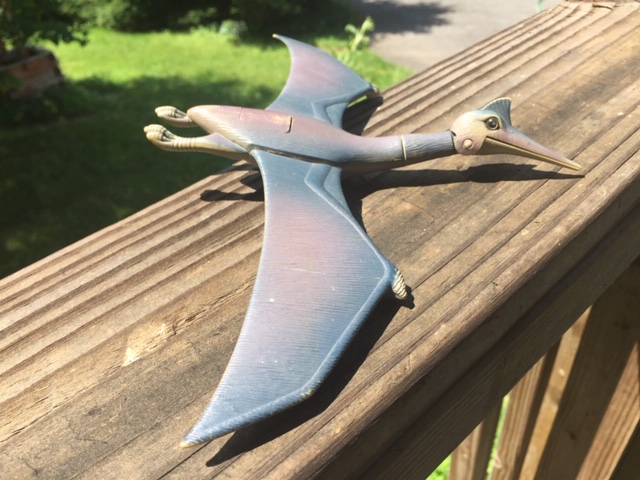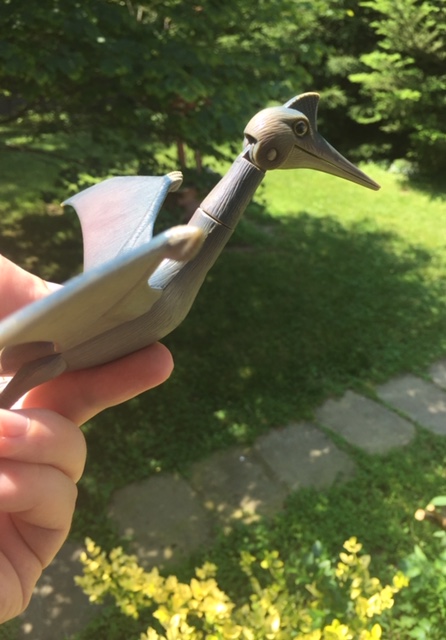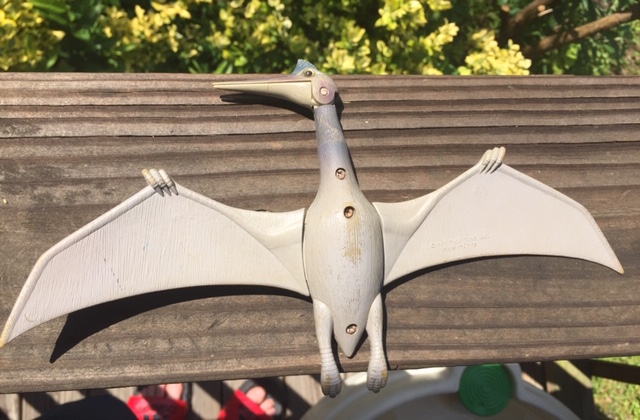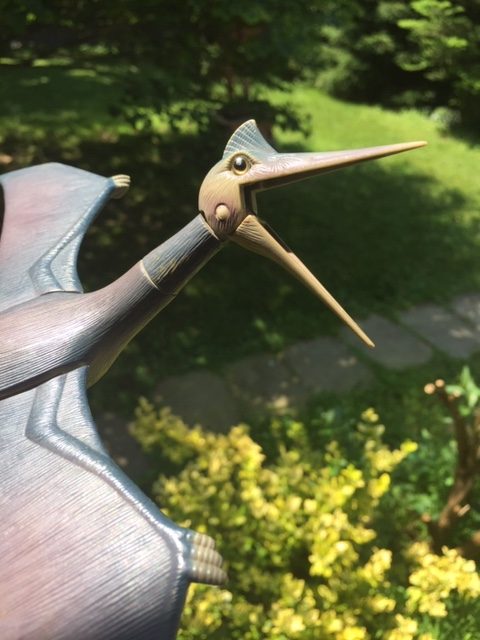Review and photos by dinoguy2, edited by Suspsy
The first series in the Dino-Riders line, released in 1987, is not exactly known for its scientific accuracy. The second series brought us some frankly very radical-looking Dinosaur Renaissance style figures, including a very modern take on Kentrosaurus and even a feathered Struthiomimus. The first series though . . well, while the quality of toys was very good, their designs were decidedly from the 1960s.
The exceptions to that rule were the pterosaurs. While out of date by modern standards, the Dino-Riders pterosaurs looked and even acted in accordance with current (for 1987) ideas about these flying archosaurs. The Quetzalcoatlus is a fine illustration of this. It is basically a repaint of the Tyco Pteranodon, but with a different head and a slightly longer neck piece. Not much was known about azhdarchid anatomy at this point, so you can kind of forgive Tyco for not quite nailing the unique proportions this animal should have, like an even longer neck, larger head, and much longer legs compared to the better-known Pteranodon. Still, Tyco should be commended on what they got right in this figure. The beak is long and pointy, and totally toothless, which is more like a real azhdarchid than the John Sibbick-style Quetz that would dominate popular depictions throughout the 1990s (most notably in the form of the Carnegie Collection version). The eyes are small transparent beads, like a doll’s eyes. As in most other Dino-Riders toys, this gives the model an unnervingly natural appearance. The head is topped by a small triangular crest, similar to the one given to Pterodactylus. There is evidence that at least the smaller species of Quetzalcoatlus had such a crest, though its exact shape is not known. I’m not sure how much credit the sculptor should get here, or if this was just a lucky guess. The lower jaw is movable, and actually opens quite wide, allowing for some decent action poses.

As mentioned above, the neck is a separately articulated piece, absent from the Pteranodon, added here to increase neck length. The head attaches with a hinge/swivel joint, so the head can look either straight ahead or point down to look at the ground. The neck piece was made a little longer than the one given to Pteranodon, but not long enough based on what we now know about azhdarchids’ ridiculous necks.
Past that, the figure is identical to the Pteranodon, but with a gray color scheme. It is dark gray on top and light gray on bottom, with some dark purple highlights. The wingspan is the same as Pteranodon, measuring in at 26cm. Like the Pteranodon, the wing and leg arrangement was quite current for its time. During the late 1980s, Kevin Padian was popularizing his more bird-like view of pterosaurs, in contrast to the older bat-like view. Padian thought the wing membranes attached at the hip, leaving the legs free to walk bipedally. The legs were thought to be held up against the bottom of the body while in flight, as in many birds. This is exactly how Tyco’s Quetzalcoatlus is put together, and it actually includes an action feature – a button on the back that allows the wings to flap. This was a somewhat revolutionary idea in the ‘80s, as most popular books described pterosaurs as nothing but passive gliders. And the feature is surprisingly durable – the flapping action still works perfectly today, despite many years of abuse.

Maybe most revolutionary of all, both the Pteranodon and the Quetzalcoatlus are sculpted with fur-like “pycnofibers” covering the body, face, and neck. The wings are also covered in finely sculpted lines possibly representing actinofibrils (though these would probably not be externally visible in life, and might just have been added for extra texture). The underside of this figure is less detailed, and the foot anatomy seems off, with somewhat bird-like feet and big thick claws. Like I said, this figure is far out of date by modern standards; newer evidence showed most of Padian’s ideas were incorrect, and pterosaurs really did have a more bat-like wing arrangement.

The Quetz obviously came with that series’ trademark battle armor, including a saddle and a little human figure (named Yungstar) to ride it. The figure was re-released twice with two new versions over the years. First, in the rare Series 3 of Dino-Riders, it was given a very bright yellow and orange color scheme with black spots on the wings. This one was an evil Rulon, and came with an alligator-headed alien named Algar. It was rereleased in its original colors for Tyco’s Smithsonian Museum line. This time, it was somewhat confusingly re-christened as Pterodactylus and it had its crest removed. Meanwhile, the much smaller Dino-Riders Pterodactylus was repacked in the Smithsonian line unchanged, and labelled Quetzalcoatlus! Clearly, somebody at the Smithsonian thought Pterodactylus should not have a crest, so the crest on one of these figures had to go – the one with a separately sculpted head was probably easier to retool.

Tyco’s Quetzalcoatlus sits squarely in the spirit of their Dino-Riders line as a whole: fun action figures combined with fairly rigorous science. Later versions of the packaging even described these as “museum quality” even before the partnership with the Smithsonian that made them an official museum line alongside the likes of Carnegie and Invicta. The action features and mechanical-looking articulation somewhat compromise their aesthetic value compared to those other lines, but I think this figure does a better job of combining science and play, and may beat Kenner’s later Jurassic Park line (which included a Pteranodon with very similar action features) in terms of aesthetics.
Disclaimer: links to Ebay and Amazon on the DinoToyBlog are affiliate links, so we make a small commission if you use them. Thanks for supporting us!




Good review. I much prefer the Rulon version of this toy; way, way cooler colour scheme and superior armament. Algar would totally blast Yungstar out of the sky.